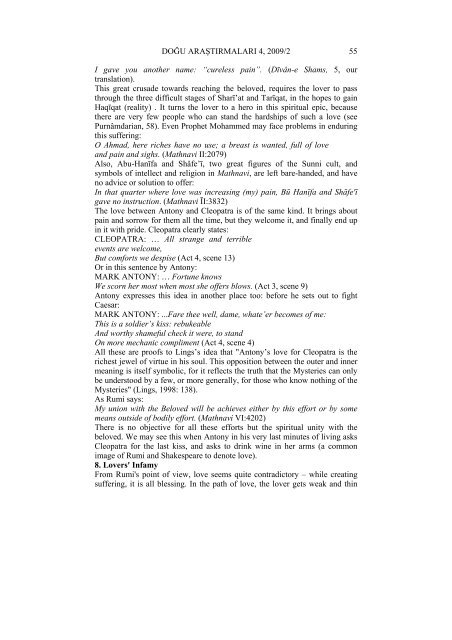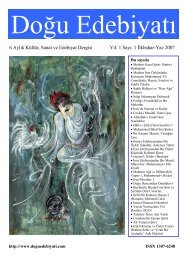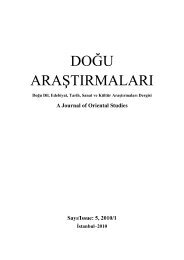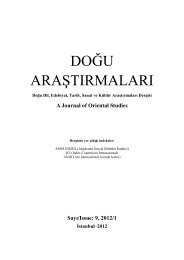A Journal of Oriental Studies Sayı/Issue - Doğu Edebiyatı
A Journal of Oriental Studies Sayı/Issue - Doğu Edebiyatı
A Journal of Oriental Studies Sayı/Issue - Doğu Edebiyatı
You also want an ePaper? Increase the reach of your titles
YUMPU automatically turns print PDFs into web optimized ePapers that Google loves.
DOĞU ARAŞTIRMALARI 4, 2009/2 55<br />
I gave you another name: “cureless pain”. (Dīvân-e Shams, 5, our<br />
translation).<br />
This great crusade towards reaching the beloved, requires the lover to pass<br />
through the three difficult stages <strong>of</strong> Sharī’at and Tarīqat, in the hopes to gain<br />
Haqīqat (reality) . It turns the lover to a hero in this spiritual epic, because<br />
there are very few people who can stand the hardships <strong>of</strong> such a love (see<br />
Purnâmdarian, 58). Even Prophet Mohammed may face problems in enduring<br />
this suffering:<br />
O Ahmad, here riches have no use; a breast is wanted, full <strong>of</strong> love<br />
and pain and sighs. (Mathnavi II:2079)<br />
Also, Abu-Hanīfa and Shâfe’ī, two great figures <strong>of</strong> the Sunni cult, and<br />
symbols <strong>of</strong> intellect and religion in Mathnavi, are left bare-handed, and have<br />
no advice or solution to <strong>of</strong>fer:<br />
In that quarter where love was increasing (my) pain, Bū Hanīfa and Shāfe'ī<br />
gave no instruction. (Mathnavi ĪI:3832)<br />
The love between Antony and Cleopatra is <strong>of</strong> the same kind. It brings about<br />
pain and sorrow for them all the time, but they welcome it, and finally end up<br />
in it with pride. Cleopatra clearly states:<br />
CLEOPATRA: … All strange and terrible<br />
events are welcome,<br />
But comforts we despise (Act 4, scene 13)<br />
Or in this sentence by Antony:<br />
MARK ANTONY: … Fortune knows<br />
We scorn her most when most she <strong>of</strong>fers blows. (Act 3, scene 9)<br />
Antony expresses this idea in another place too: before he sets out to fight<br />
Caesar:<br />
MARK ANTONY: ...Fare thee well, dame, whate’er becomes <strong>of</strong> me:<br />
This is a soldier’s kiss: rebukeable<br />
And worthy shameful check it were, to stand<br />
On more mechanic compliment (Act 4, scene 4)<br />
All these are pro<strong>of</strong>s to Lings’s idea that "Antony’s love for Cleopatra is the<br />
richest jewel <strong>of</strong> virtue in his soul. This opposition between the outer and inner<br />
meaning is itself symbolic, for it reflects the truth that the Mysteries can only<br />
be understood by a few, or more generally, for those who know nothing <strong>of</strong> the<br />
Mysteries" (Lings, 1998: 138).<br />
As Rumi says:<br />
My union with the Beloved will be achieves either by this effort or by some<br />
means outside <strong>of</strong> bodily effort. (Mathnavi VI:4202)<br />
There is no objective for all these efforts but the spiritual unity with the<br />
beloved. We may see this when Antony in his very last minutes <strong>of</strong> living asks<br />
Cleopatra for the last kiss, and asks to drink wine in her arms (a common<br />
image <strong>of</strong> Rumi and Shakespeare to denote love).<br />
8. Lovers' Infamy<br />
From Rumi's point <strong>of</strong> view, love seems quite contradictory – while creating<br />
suffering, it is all blessing. In the path <strong>of</strong> love, the lover gets weak and thin





